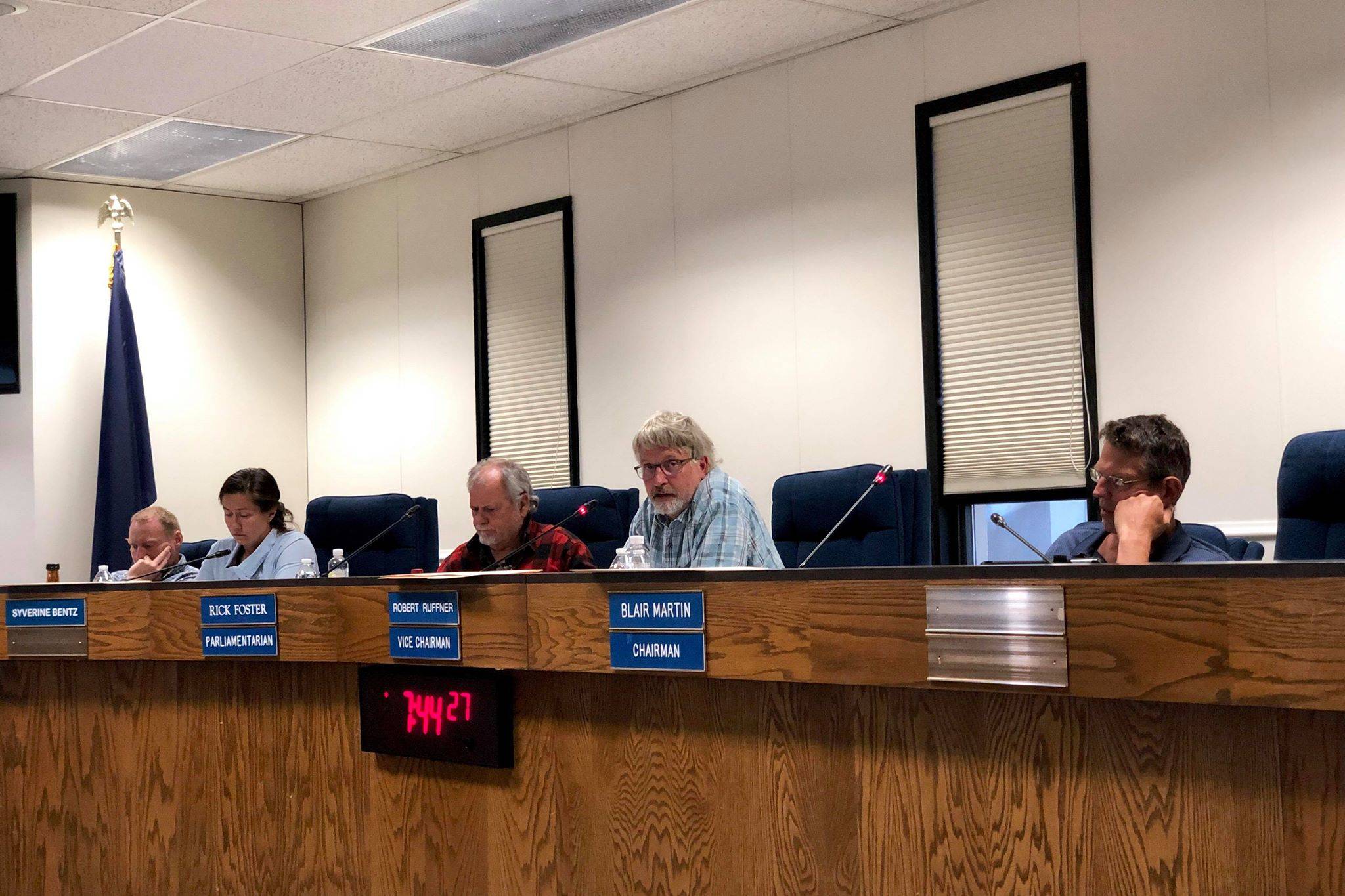A controversial gravel pit permit was approved at Monday night’s Kenai Peninsula Borough Planning Commission meeting. The vote to approve or deny the permit was postponed at the June 10 meeting after hours of public comment, much of which was in opposition of Emmitt Trimble’s Beachcomber LLC gravel pit in Anchor Point. The vote was 8-2, with commissioners Paul Whitney and Paulette Carluccio voting against the permit.
Trimble said he was happy with the commission’s decision.
“We were pleased with the process and pleased with the outcome,” Trimble said.
Neighbors opposing the gravel pit were not so happy. Hans Bilben, who lives nearly 100 feet above the proposed pit, said he was very disappointed with the outcome.
“If ever a gravel pit should be denied, it would have been this one,” he said.
He said he didn’t feel like the commissioners knew what they were voting on.
“It seemed like commissioners weren’t up on code dealing with gravel pits,” Bilben said.
The proposed pit has been the center of a yearlong controversy between Trimble and neighboring property owners, who say borough gravel pit regulations wouldn’t adequately protect their homes from the impacts of the proposed gravel mine.
Trimble is an owner of Coastal Realty, and his family has been developing and selling property in the area for 40 years. The property, totaling around 40 acres, sits at the bottom of a natural amphitheater, 500 feet from the Anchor River and near several state parks and campgrounds. He said he wants the property’s 40 or so acres to be multiuse, with 27 acres used to mine gravel, and the oceanfront parcels untouched, as a legacy property for his daughters.
The Kenai Peninsula Borough Planning Commission rarely denies gravel pit permits, but last July, Trimble’s application to excavate his Anchor Point property was denied after hours of public testimony raised concerns about potential disturbances created by the gravel pit, including impacted views, noise, dust, truck traffic and the property values of adjacent properties. Commissioners who voted to deny the permit said it wouldn’t meet the noise and visual impact conditions even with additional buffers, according to Clarion archives.
Trimble’s efforts to mine the gravel on his property is well within the law, now that the permit is granted. For property owners in unzoned areas interested in mining gravel, certain conditions in borough code must be met to get a permit, including buffers, barriers and regulations for when heavy machinery like rockcrushers can be operated. If these conditions are met, permits can be issued, despite how the conditions required in the code adequately protect neighbors.
At the June 10 meeting, the commission asked Trimble if he would be willing to implement several voluntary conditions, which aren’t required, but could help minimize impact. Trimble said he would be willing to use a white noise backup alarm to help noise impacts. Trimble said the condition would only apply to his own vehicles, and not machines belonging to contractors. He also agreed to use a rolling berm to alleviate visual impacts.
During the meeting, the planning department and the commission went over voluntary conditions placed on the applicant, and gave Trimble the opportunity to speak to those conditions. One of the new conditions prohibits activity at the pit during major summer holiday weekends, including the Fourth of July, Memorial Day and Labor Day.
Bilben called these voluntary conditions “fluff.”
“The white noise condition — the commissioners didn’t even ask if he had any equipment,” Bilben said. “Shutting down on holidays does something for parks, but it doesn’t help the neighborhood.”
Trimble said he can’t govern the noise coming from contract trucks coming to the pit, but said he would do everything he could to keep noise down.
“I can’t govern what happens with a truck that’s maybe one time going to come in there,” Trimble said at the meeting.
Public comment was not allowed on the new conditions brought forward at Monday’s meeting.
Trimble said he’s already started mining gravel on the property, on the small, 2.5-acre parcel he permitted about a year ago. Since the access bridge over the Anchor River can only hold 11 tons, Trimble said he will wait until the bridge is repaired to have gravel trucks travel over it, which he hopes will be by next summer.
Bilben said the commission’s decision will be appealed.
“It will be appealed again,” he said. “I think we have fairly strong grounds to appeal. I’m very disappointed, as was most of Anchor Point.”

